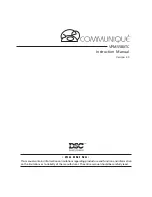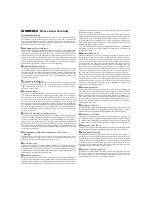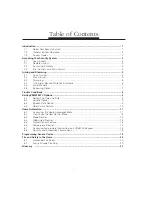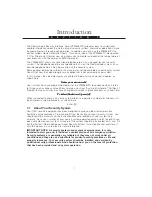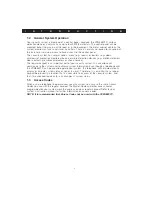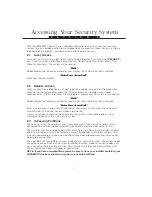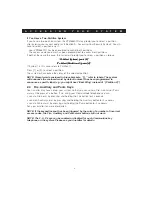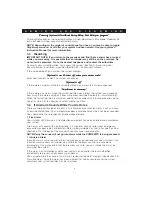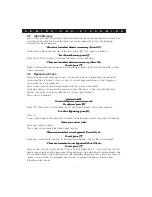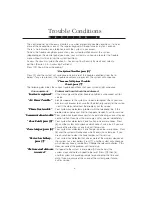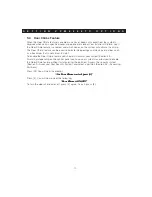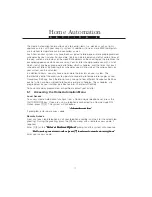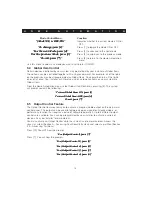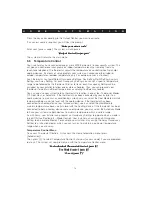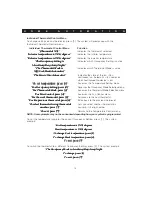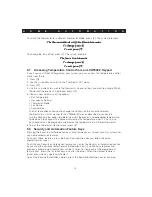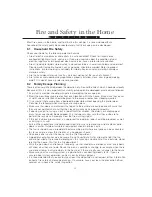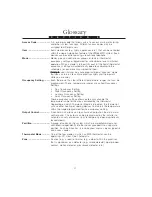
6
A R M I N G A N D D I S A R M I N G
“Turning {System} ON without Entry Delay. Exit Delay in progress”
“Turning {System} ON without Entry Delay. Exit Delay in progress”
“Turning {System} ON without Entry Delay. Exit Delay in progress”
“Turning {System} ON without Entry Delay. Exit Delay in progress”
“Turning {System} ON without Entry Delay. Exit Delay in progress”
After exit delay expires, the selected partition will now be armed in Stay Mode. Opening the
entry-exit door will now sound an immediate alarm.
NOTE: Depending on the model of control panel you have, you may be able to toggle
Stay/Away zones on or off after your system has been armed. See your system's
Instruction Manual for more information.
3.3
Disarming
IMPORTANT NOTE: If you return to the premises and find that an alarm has occurred
while you were away, it is possible that an intruder may still be on the premises. Do
not enter the premises. Go to the nearest telephone and contact the authorities.
To disarm your system/partition, first access the system (Section 2—Accessing Your
Security System) and select a partition (Section 2.3—Accessing Partitions).
If the selected partition is armed, the system prompts:
“{System} is on. To turn off, enter your access code.”
“{System} is on. To turn off, enter your access code.”
“{System} is on. To turn off, enter your access code.”
“{System} is on. To turn off, enter your access code.”
“{System} is on. To turn off, enter your access code.”
Enter your [access code]. The system announces:
“{System} is off.”
“{System} is off.”
“{System} is off.”
“{System} is off.”
“{System} is off.”
If there were no alarms while the system/partition was armed, the system announces:
“No alarms in memory.”
“No alarms in memory.”
“No alarms in memory.”
“No alarms in memory.”
“No alarms in memory.”
If there were any alarms when the system/partition was armed, the system can announce
how many there were and which zones were breached (see Section 3.5—Alarm Memory).
When the system/partition is disarmed, additional messages may be announced to advise
you of its status, or to allow you to select another partition.
3.4
If An Alarm Sounds While You Are Home
There are two possible types of alarm, a Fire Alarm and an Intrusion Alarm. Each can have
its own distinctive tone. Your immediate response will depend on which has been sounded.
You should have these responses planned ahead of time.
•
Fire Alarm
Your installer will inform you if fire detection equipment has been installed and activated on
your system.
Fire alarms will sound with a pulsing tone. If a fire alarm sounds, follow your emergency
evacuation response plan immediately. Refer to the guidelines for Family Escape Planning
(Section 8.2) at the back of this manual to construct your response plan.
NOTE: Delay fire zones will not go into alarm while the VPM5580TC is being accessed.
•
Intrusion Alarm
Intrusion alarms will sound with either a continuous or pulsed tone (ask your installer). If an
intrusion alarm sounds, an intruder may still be on the premises. Go to a safe place
immediately. If you are certain that the premises are safe, you can silence the alarm by
disarming the system.
If the alarm was unintentional, notify your central station and/or the local authorities
immediately to prevent an unnecessary response.
You can determine the cause of an alarm by reviewing the alarm memory (see Section 3.5—
Alarm Memory). Once the alarm has been cleared (i.e. zones secured) and the system
disarmed, your system/partition can be re-armed.

